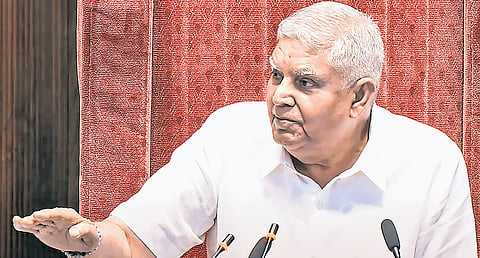

NEW DELHI: Rajya Sabha Chairman Jagdeep Dhankhar on Wednesday asserted that the government is the “ultimate” authority, emphasising that governance in a democracy must rest solely with the executive rather than the judiciary, as the former is accountable to Parliament and the electorate.
Dhankhar made these remarks during Question Hour after Union Education Minister Dharmendra Pradhan referenced Supreme Court directives while responding to a demand from DMK MP Kanimozhi NVN Somu to decentralise the National Eligibility cum Entrance Test (NEET).
The DMK MP questioned why the government could not “restrict tests for entry towards its institutions and decentralise where states fill up based on marks scored in state board exams”. Pradhan pointed out that the UPA government had introduced the centralised examination system and that the Supreme Court had issued directives supporting the centralised structure of the medical entrance test.
“The core of the question is why don’t you dismantle the NEET exam and grant authority to states,” Pradhan remarked, adding, “We have to continue with it. She was very much a part of that government. She could have prevailed upon them then.”
The minister also acknowledged challenges in past NEET examinations but assured that continuous improvements were being made. “The NTA is doing a tremendous job. It will be a highly robust entrance testing mechanism for the country”, he said.
At this juncture, Chairman Dhankhar interjected, questioning: “Can the government cede its executive authority to the court?”
Dhankhar asserted, “Governance in a democracy must be undertaken solely by the executive. The executive branch is accountable to Parliament and the electorate. How can executive governance be carried out by any other entity?”
He argued, “Because the people elect the executive to govern the nation, attention must also be given to this matter. This extends beyond your ministry. However, we cannot have executive governance occurring outside of the government. The government is ultimate”.
In response to supplementary questions, Pradhan stated that funds had been allocated for broadband connectivity in the 2025-26 Budget to enhance digital access, which aligns with the priorities outlined in the National Education Policy.
Addressing concerns over the draft UGC guidelines, CPI(M) leader John Brittas also raised objections to the overriding powers granted to Governors in the search and selection committees and the lack of job security for contractual academic staff.
In response, Pradhan cited instances where “influential persons from Chief Ministers’ offices were appointing their wives and cronies as Vice-Chancellors and lecturers”.
The minister also underscored the Modi government’s commitment to social justice, highlighting that before 2018, no regulations ensured constitutional protection for Scheduled Castes (SC) and Scheduled Tribes (ST) in the
appointments of assistant and associate professors. “For the first time, Prime Minister Modi enacted a visionary bill and regulations. There cannot be a category of ‘not found suitable candidate’,” he said.